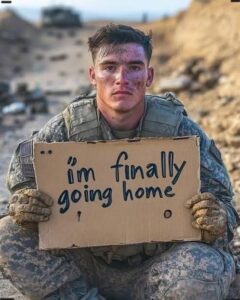“I’m Finally Going Home”
The dirt beneath his boots felt heavier than ever—almost as if the earth itself was trying to pull him down, begging him not to walk away. His uniform was torn, covered in dust, ash, and the dried blood of battles he never wanted to fight. His hands trembled as he held the piece of cardboard, the one message he had dreamed of writing for years:
I’m finally going home.

He wasn’t smiling.
He couldn’t.
The young soldier sat alone on the battlefield path, surrounded by the silent remains of everything he had survived. Behind his exhausted eyes lived stories he would never fully tell—faces he could never forget, screams that echoed in the back of his mind no matter how hard he tried to bury them.
He was the youngest in his unit when he arrived. A boy with dreams, laughter, and a quiet belief that he would come back quickly, without scars, without nightmares. But war changes the definition of “home,” and it changes the meaning of “coming back.”
He remembered the first night he arrived at the base—how the older soldiers had teased him for carrying a photograph of his mother folded carefully in his pocket. He remembered how he used to write her letters every night, even when he had no strength left to hold the pen. “I’m fine, Mom,” he always wrote. He lied, not because he wanted to—
but because he knew she wouldn’t sleep otherwise.
One by one, the men he laughed with, trained with, ate with—
were taken.
Some in seconds.
Some in slow, agonizing hours.
Some in ways that left no words behind, only silence.
He had learned to sleep next to explosions.
He had learned to run when he wanted to freeze.
He had learned to carry the weight of the wounded even when his legs were shaking.
And he had learned that the hardest pain was not the wounds on his skin—
but the grief he carried inside his chest.
The last battle had been the worst.
He remembered the dust storm, the smoke, the sudden burst of fire. He remembered reaching out for his friend’s hand—only to grab air. He remembered kneeling beside him, trying to stop the bleeding, whispering, “Stay with me. Please stay,” even though he knew he couldn’t.
His friend had smiled weakly and whispered,
“You’ll make it home for both of us.”
Now, as he held the cardboard sign, he thought of that moment.
He wasn’t going home alone.
He was carrying every memory, every sacrifice, every name carved into the back of his heart.
His face was bruised, scratched, and tired—
but in his eyes, there was something else too:
a small spark of hope.
Home.
A bed that wasn’t made of cold ground.
A meal that wasn’t eaten in silence.
A hug that lasted longer than a second.
A voice that didn’t shout orders.
A world where he could finally breathe.
But he also feared going home.
How do you explain to your family that you feel older than your own father?
How do you explain that silence can be louder than bombs?
How do you explain that you survived, but parts of you didn’t?
He didn’t know the answers.
He only knew one thing:
He was finally done fighting.
With one deep breath, he stood up, holding the sign close to his chest. The road ahead was long, but it led to the place he had dreamed of every night—the place where someone would be waiting, maybe crying, maybe smiling, maybe both.
He whispered to himself,
“I made it… I’m going home.”
But behind him, the battlefield remained.
And even though his feet would walk away,
a piece of his heart would always stay there—
with the ones who never got the chance to write the same sign.